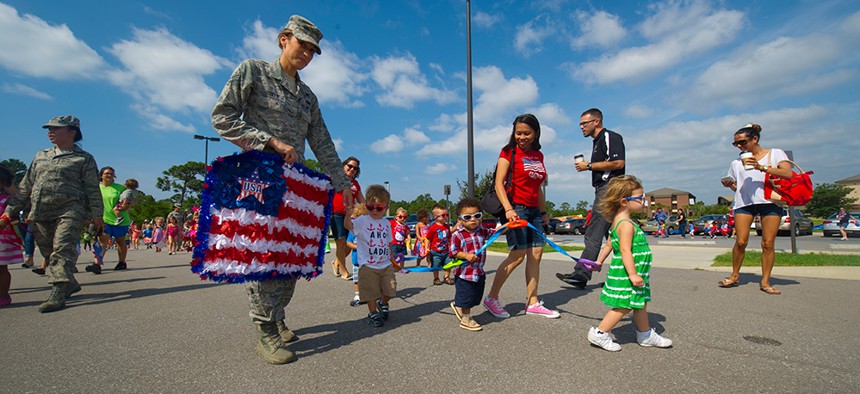
Children, parents, and employees of the Child Development Center East march around the parking lot during a parade in honor of Flag Day on Hurlburt Field in 2013. Defense Department file photo
The United States Military Gets Childcare Right
The Pentagon helps care for servicemembers' children.
The recent revelations about a Fort Hood prostitution ring in which US soldiers lured female privates to participate doesn’t reflect well on the military’s ability to protect its own. The fact that some of these women were cash-strapped moms looking to feed their families puts an even bleaker spin on the military’s concern for its minions.
And yet in spite of all the military’s failures, especially toward women, there is one arena in which it has risen to distinction. Recognized by president Clinton in 1998 as a leader in child development centers, the military provides state-of-the-art daily care to more than 200,000 children from newborns through 12 years.
A Forbes survey reveals that the best places to work often prioritize work-life-balance for their employees, and most offer on-site daycare. Standouts like Google, the Mayo Clinic, and Nestle Purina boast state-of-the-art facilities that ease the struggle for working parents.
Although many people agree that affordable child care is among the top concerns for working families, the US lags behind its wealthy peers in providing subsidized, universal daycare and quality preschool opportunities for all.
Since the late 1940s, child care in the US has suffered from an association of subsidized day care with Communism. Following WWII, restructured tax laws and the family wage put married women at a financial disadvantage. For many women, it didn’t pay to work outside the home. To this day, Americans’ resistance to day care continues to be dominated by ideals of domesticity that place women at home with the kids—even when they labor outside of it.
Fifteen years ago, Ann Crittenden joked that if you want high quality, affordable child care, your best bet is to join the military. The same holds true today. Perhaps it is time to put their tactics back in focus.
In 1989, the US congress passed the Military Child Care Act. This act set in motion the Department of Defense’s creation of military child development centers that have been recognized as the national standard bearers for quality of care. With almost 2 million military children to protect, the military is one the largest employer-sponsored programs of its kind in the country.
The act ensured that fees for child development centers are based on family income and government matches. It established an accreditation initiative, an inspection regime, systematized child abuse prevention, and safety protocols. Military child development centers operate at more than 300 locations. Nearly 95% of the military’s centers are accredited by the National Academy of Early Childhood Programs, a division of the National Association for the Education of Young Children. Military officials have also set up partnerships with local elementary schools to operate school-age care programs.
The military has a motto that could serve as a model for thinking about more mainstream access: “Workforce readiness begins with high quality child care.” The military isn’t the only work force whose readiness, efficiency, and retention suffers when children aren’t accounted for; these are issues that impact the civilian work force as well. And this includes mothers who work at home.
Certainly the demands of military service require frequent deployments, standing duty, training, and unpredictable work schedules that may mean unexpected family moves.
According to research on military families, there also has been an increase in single parent and dual-parent military families. All of these factors taken together demonstrate that excellent, affordable child care is a necessity for parents in the armed forces.
According to Linda K. Smith, director of the Pentagon’s Office of Family Policy, one of the key aspects of the Department of Defense centers is the attention paid to the workers: quality of work conditions is intimately connected to quality of care. The military network employs nearly 23,000 child-care workers, 7,300 of whom are military spouses.
Training, education and on the job performance determine caregivers’ wages and advancement. An “up or out” policy underscores that these workers are childcare professionals. And the military pays higher than standard wages to reduce workplace turnover.
To be sure, there are special challenges faced by military families that make government support mandatory. Constant relocation, deployment, and reintegration make life particularly hard on military children. On top of that, the long and multiple deployments, and potential—and in some cases actual loss—of a parent create particular stresses for children of the military.
While the military child development centers are recognized in the industry as the best in the country, researchers have not assessed the effects of these centers on the educational, social, and emotional development of military children.
Detractors of child care may say that children are better off at home. But research shows that it is the quality and quantity of care—and not child care itself—that impacts child development.
Seeing the military as ahead of the social curve may require both conservatives and liberals to readjust their presumptions about our armed forces. To be sure, the military is a breeding ground for sexism, including sexual assault, harassment, homophobia, and gender discrimination. But, on some issues the military has been a socially progressive institution: they desegregated their ranks well before Brown v. Board.
Why shouldn’t we follow the military’s lead and support child development alongside all parents’ right to work as national obligations? After all, offering access to high quality, affordable child care, is our patriotic duty.






